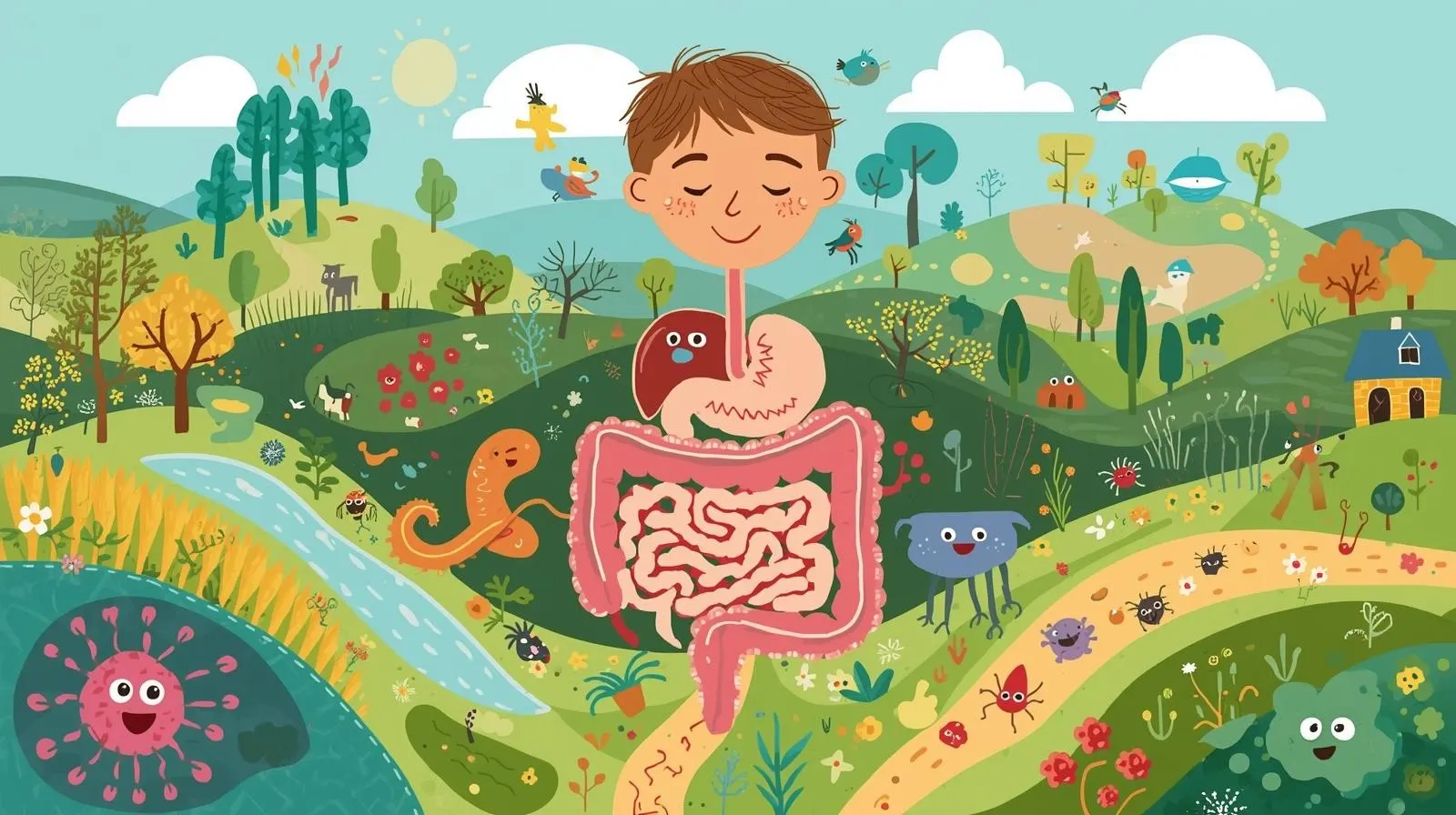Binge eating can have several negative effects on a person’s health, including impacting their gut health.
Here’s how binge eating might affect your child’s gut:
- Imbalanced Gut Microbiota: Binge eating often involves consuming large quantities of unhealthy,
processed foods high in sugars and fats. These foods can disrupt the balance of gut bacteria, leading to an imbalance in the gut microbiota. A diverse and balanced gut microbiota is crucial for proper digestion and overall health. - Inflammation: Binge eating can lead to chronic inflammation in the body. Inflammation in the gut can damage the intestinal lining, leading to conditions like leaky gut syndrome. When the intestinal barrier is compromised, harmful substances can leak into the bloodstream, triggering immune responses and potentially leading to various health issues.
- Digestive Disorders: Binge eating can contribute to the development of digestive disorders such as
irritable bowel syndrome (IBS) and acid reflux. The excessive intake of certain foods can irritate the
gastrointestinal tract, causing discomfort, bloating, and other digestive symptoms. - Increased Risk of Obesity: Binge eating is often associated with consuming high-calorie, low-nutrient foods. Continuous overeating can lead to obesity, which itself is linked to gut health issues. Obesity alters the gut microbiota composition and can increase the risk of gastrointestinal diseases.
- Nutrient Absorption Issues: Binge eating episodes can overload the digestive system. This overload, combined with the consumption of unhealthy foods, can interfere with the proper absorption of essential nutrients. Over time, this can lead to nutrient deficiencies, affecting overall health and well-being.
- Mental Health Impact: Binge eating is often related to emotional issues, such as stress, anxiety, or
depression. Mental health problems can influence gut health through the gut-brain axis, a bidirectional communication system between the central nervous system and the gut. Emotional stress can disrupt the balance of gut bacteria and lead to gastrointestinal symptoms. - Development of Food Sensitivities: Regular binge eating might expose the gut to specific food items in excessive amounts. Over time, this could contribute to the development of food sensitivities or allergies, causing adverse reactions in the gastrointestinal system.
- Increased Risk of Metabolic Disorders: Binge eating, especially when associated with obesity, increases the risk of metabolic disorders such as type 2 diabetes. These conditions can further impact gut health by disrupting the body’s ability to regulate blood sugar levels and inflammation.
It is important to note that if you suspect your child is struggling with binge eating or any related health issues, it is crucial to seek help from a Dietician. A registered dietitian can provide appropriate guidance and support tailored to your child’s specific needs.
1. Arguments, aggression and stress in teens and its overall effects on the food consumed-
The relationship between aggression in teens and their dietary habits is a complex and multifaceted topic
that has been studied by researchers in the fields of psychology, sociology, and nutrition. While there is no direct and universally agreed-upon link between aggression and specific food consumption, several factors and theories have been explored to understand this relationship. Here are some key points to consider:
- Emotional Eating: Stress and Emotional Eating: Teens, like adults, might resort to emotional eating when they are feeling stressed, angry, or upset. Aggression can lead to stress, and some individuals cope with stress by consuming comfort foods, which are often high in sugar and fat.
- Nutritional Choices: Poor Nutritional Choices: Teens experiencing aggression might make poor dietary choices, opting for fast food, sugary snacks, and processed foods. These food items are often low in nutritional value and high in calories, leading to potential health issues in the long run.
- Socioeconomic Factors: Socioeconomic Status: Socioeconomic status can play a role. Teens from low-income families might have limited access to nutritious food, leading to a reliance on cheaper, unhealthy options.
- Parental Influence: Parental Influence: Parental behavior and dietary patterns can influence teens.
Aggressive behaviour might be learned from parents, and so can unhealthily eating habits if parents do not prioritise nutritious meals. - Psychological Factors: Mood Regulation: Some studies suggest that certain food items, especially those high in sugar, might temporarily improve mood. Teens experiencing aggression might consume these foods to regulate their mood.
- Hormonal Changes: Hormonal Changes: Adolescence is a time of significant hormonal changes, which can affect mood and behaviour. These hormonal shifts might also influence food cravings and choices.
- Interventions and Solutions: Educational Programs: Implementing educational programs in schools that teach teens about nutrition, stress management, and healthy coping mechanisms can be beneficial.
Access to Nutritious Food: Improving access to affordable, nutritious food in schools and low-
income communities can encourage healthier eating habits.
Therapeutic Interventions: For teens experiencing aggression related to underlying psychological issues, therapeutic interventions like counseling and anger management can address the root causes, potentially reducing the reliance on aggressive behaviors and unhealthy eating patterns.
In conclusion, while there is no direct causation between aggression in teens and specific food consumption, there are intricate connections between emotional states, social factors, and dietary habits. Understanding these factors can help in developing comprehensive strategies to promote healthy eating habits and emotional well-being among adolescents.
2. Peer pressures and the food choices-
Peer pressure can significantly influence various aspects of a teenager’s life, including their food
consumption habits. Here’s how peer pressure can impact food consumption:
- Food Choices: Imitating Peers: Teens often imitate their peers, including their food choices. If a group of friends prefers unhealthy fast food or sugary snacks, an adolescent may be more likely to consume similar items to fit in and avoid social exclusion.
- Eating Patterns: Meal Skipping: Peer pressure can influence eating patterns, leading to behaviors like skipping meals or undereating. Some teens might skip meals to align with their peers who are dieting or to achieve a certain body image, even if it’s unhealthy.
- Body Image Concerns: Dieting and Disordered Eating: Adolescents might succumb to peer pressure to conform to societal standards of beauty. This pressure can lead to dieting behaviors, which might involve extreme restrictions, binge eating, or purging. Peer pressure can contribute to the development of eating disorders like anorexia nervosa, bulimia nervosa, or binge eating disorder.
- Unhealthy Food Choices: Junk Food Consumption: Peer groups might encourage the consumption of junk food, sugary beverages, and snacks high in calories and low in nutrients. Regularly consuming these items can lead to obesity and related health problems.
- Positive Peer Influence: Healthy Eating Habits: Conversely, positive peer influence can promote healthy eating habits. If a teenager’s social circle values nutritious foods and engages in physical activities, the adolescent is more likely to adopt similar habits.
- Social Settings and Eating Out: Eating Out: Teens often socialize in settings like malls or fast-food
restaurants. Peer pressure in such environments can lead to the consumption of unhealthy foods and large portions, contributing to poor dietary choices. - Alcohol and Substance Use: Increased Appetite: Peer pressure related to alcohol or substance use
might lead to increased appetite and unhealthy food choices, especially late at night. Alcohol and certain substances can impair judgment, leading to overeating or making poor food choices. - Cultural and Social Influences: Cultural Norms: Cultural norms within peer groups can strongly influence food choices. Certain cultures have specific dietary habits, and teens might feel pressure to adhere to these norms, whether they are healthy or not.
- Resisting Peer Pressure:
Educational Support: Teens equipped with nutritional education and strong self-esteem are better able to resist negative peer pressure and make healthier food choices.
Parental Involvement: Supportive parents who encourage healthy eating and provide nutritious
meals can counterbalance negative peer influences.
Peer Education: Positive peer influence programs within schools can promote healthy eating habits and body positivity among teens.
It is crucial for parents, educators, and communities to promote positive peer influences and provide resources to help teenagers make informed, healthy choices regarding their food consumption habits. Education, open communication, and fostering self-confidence can empower teens to resist negative peer pressure and prioritise their well-being.
3. Examination stress and those add on calories –
Examination stress can significantly impact an individual’s eating habits and, in some cases, lead to
consuming additional calories. Here’s how examination stress can influence calorie intake:
- Emotional Eating: Stress and Comfort Food: Many people turn to comfort foods high in sugars and fats when they are stressed. These foods often provide a temporary feeling of comfort and relief, but they are also calorie-dense. Consuming them excessively can lead to an increase in calorie intake.
- Irregular Eating Patterns: Skipping Meals: During periods of high stress, individuals might skip meals due to lack of appetite or time constraints. Skipping meals can lead to intense hunger later, causing overeating and choosing calorie-rich, convenient foods.
- Increased Cravings: Carbohydrate Cravings: Stress can trigger cravings for carbohydrate-rich foods like sweets, pastries, and snacks. Carbohydrates can temporarily increase serotonin levels, making individuals feel better temporarily. However, these foods are often high in calories.
- Lack of Physical Activity: Reduced Exercise: Stress might lead to a decrease in physical activity as
individuals spend more time studying and less time engaging in physical activities. Reduced exercise can lead to a calorie surplus if dietary habits remain the same, contributing to weight gain. - Social and Peer Influence: Social Eating: Studying with friends or taking breaks with classmates might involve consuming calorie-laden snacks and drinks. Social pressure to participate in these activities can lead to consuming extra calories unintentionally.
- Caffeine and Sugar Intake: Energy Drinks and Sugary Beverages: Some individuals turn to energy
drinks, sugary beverages, or excessive coffee consumption to stay awake and alert during study sessions. These drinks are high in calories and can contribute to weight gain if consumed in excess. - Healthy Coping Mechanisms: Lack of Healthy Coping: Stress might hinder individuals from adopting healthy coping mechanisms, such as exercise, meditation, or relaxation techniques. Instead, they resort to calorie-laden foods for temporary relief.
- Addressing Stress-Related Eating: Mindful Eating: Encouraging mindful eating practices can help
individuals become more aware of their eating habits and prevent mindless consumption of high-calorie foods.
Stress Management: Teaching effective stress management techniques, such as deep breathing, yoga, or talking to a counsellor, can help individuals cope with stress without resorting to emotional eating.
Balanced Nutrition: Ensuring individuals have access to nutritious, balanced meals during stressful periods can prevent overeating of unhealthy foods.
It is essential for individuals experiencing examination stress to be mindful of their eating habits and to seek support if they find themselves turning to unhealthy foods as a coping mechanism. Additionally, creating a supportive environment that promotes healthy eating and stress management can significantly impact a person’s overall well-being during stressful times.
4. Screen time effects on overall food absorption-
Excessive screen time, especially during meals, can have several negative effects on overall food
absorption and digestion. Here are a few ways in which excessive screen time can impact your ability to
absorb nutrients properly:
1.Distraction and Mindless Eating: When you are engrossed in a screen, you are more likely to eat
mindlessly. This means you might not chew your food thoroughly, leading to larger food particles entering your digestive system. Proper chewing is essential for the initial breakdown of food, which aids in better nutrient absorption in the later stages of digestion.
2.Poor Posture: Prolonged screen time can lead to poor posture, especially if you are hunched over a
device. Poor posture can compress your digestive organs, potentially leading to issues like acid reflux and slowed digestion. Proper digestion requires your body to be in a relaxed state, which is difficult to achieve with poor posture.
3.Increased Stress: Excessive screen time, particularly on social media or while reading stressful news,
can increase stress levels. High-stress levels can affect the functioning of your digestive system. Stress
can lead to decreased blood flow to the digestive organs, potentially slowing down the absorption of
nutrients.
4.Disrupted Circadian Rhythms: Screen time, especially before bedtime, can disrupt your sleep patterns. Disrupted circadian rhythms can affect the production of hormones that regulate hunger and satiety. Irregular eating patterns can impact your body’s ability to absorb nutrients optimally.
5.Blue Light Exposure: Screens emit blue light, which can suppress the production of melatonin, a hormone that regulates sleep. Poor sleep quality can lead to hormonal imbalances that might affect your appetite and, subsequently, your overall food absorption.
6.Reduced Physical Activity: Excessive screen time often means a sedentary lifestyle. Regular physical
activity is essential for maintaining a healthy digestive system. Lack of movement can lead to constipation and other digestive issues, hindering proper nutrient absorption.
To promote optimal food absorption, it is essential to be mindful of your screen time and practice good habits such as eating without distractions, maintaining good posture, managing stress, getting regular exercise, and ensuring you get adequate sleep. Balancing screen time with other activities and being mindful of your overall health and well-being can positively impact your body’s ability to absorb nutrients effectively.
5. Dark chocolate as a sweet treat- and its calming properties in adolescents-
Dark chocolate has gained popularity not only for its rich flavor but also for its potential health benefits. It
contains compounds such as flavonoids, antioxidants, and other bioactive components that have been
studied for their potential effects on mood and stress.
In the context of adolescents, some research suggests that dark chocolate might have calming properties due to its effects on neurotransmitters in the brain. One of the key compounds in dark chocolate is phenylethylamine, which can trigger the release of endorphins, creating a sense of pleasure and well-being.
Additionally, dark chocolate contains a small amount of caffeine, which can have a stimulating effect on the central nervous system. However, the amount of caffeine in dark chocolate is much lower than in coffee or energy drinks, so it is unlikely to cause significant restlessness or jitteriness in most people, including adolescents.
Furthermore, dark chocolate also contains magnesium, which is known to relax muscles and promote a
sense of calm. Magnesium deficiency has been linked to increased stress and anxiety levels, so consuming foods rich in magnesium, like dark chocolate, may help alleviate these symptoms.
It is important to note that while dark chocolate may have potential calming properties, it should be
consumed in moderation. Excessive consumption can lead to weight gain and other health issues. Also,
individual responses to chocolate can vary, so some adolescents might find it more effective in inducing
calmness than others.
In conclusion, if an adolescent is experiencing significant stress or anxiety, it is crucial to seek appropriate medical, nutritional, or psychological help. While dark chocolate might provide
temporary relief, addressing the root causes of stress and anxiety through professional guidance
and support is essential for long-term well-being.
GIVEN A CHOICE, ALWAYS GO FOR A DARK CHOCOLATE THAN A WHITE ONE!




